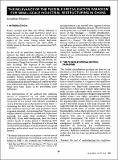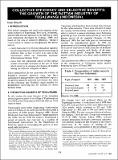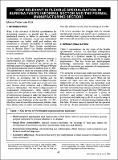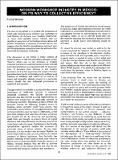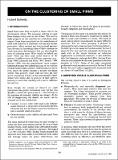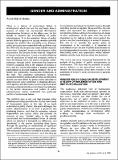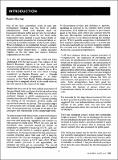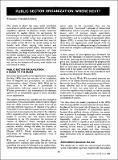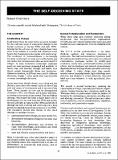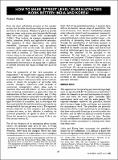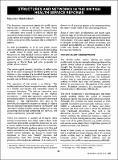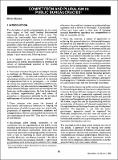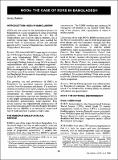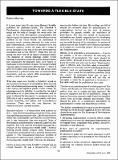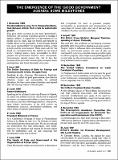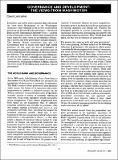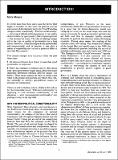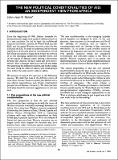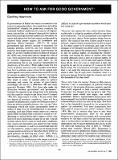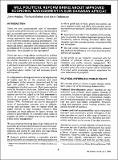Volumes 21 - 30: Getting Institutions Right for Women in Development: Recent submissions
Now showing items 121-140 of 444
-
The Relevance of the Flexible Specialisation Paradigm for Small?Scale Industrial Restructuring in Ghana
(Institute of Development Studies, 01/07/1992)Summary This article focuses on a large cluster of small enterprises in Kumasi, Ghana. It suggests that the flexible specialisation paradigm only helps to explain the growth of some of the small enterprises, namely a group ... -
Collective Efficiency and Selective Benefits: the Growth of the Rattan Industry of Tegalwangi (Indonesia)
(Institute of Development Studies, 01/07/1992)Summary This article focuses on a cluster of rattan producers in Indonesia. It shows rapid growth of local industry aided by public intervention and based on collective efficiency. However, the benefits of such growth ... -
How Relevant is Flexible Specialisation in Burkina Faso's Informal Sector and the Formal Manufacturing Sector?
(Institute of Development Studies, 01/07/1992)Summary To determine whether flexible specialisation can be found in the informal sector or in the formal industrial sector in Burkina Faso, the term is defined in such a manner that its importance can be assessed. It ... -
Modern Workshop Industry in Mexico: on its way to Collective Efficiency?
(Institute of Development Studies, 01/07/1992)Summary The article uses the example of garment production in a small Mexican town to explore and elaborate on one central concept in the flexible specialisation approach: collective efficiency. Particular weight is put ... -
On the Clustering of Small Firms
(Institute of Development Studies, 01/07/1992)Summary This article is concerned with the viability of small?scale manufacturing in LDCs. Its purpose is to put forward a few categories which may help to disentangle the issue and to suggest a line of research. The ... -
Gender and Administration
(Institute of Development Studies, 01/10/1992)Summary Public administration in development has been a poor instrument for implementing gender policies. Rural development administration in particular has tended to be indifferently accountable to female ‘publics’ in ... -
Introduction
(Institute of Development Studies, 01/10/1992) -
Public Sector Organization: Where next?
(Institute of Development Studies, 01/10/1992)Summary This paper is about the three major neo?liberal innovations in public sector organization of the 1980s: ‘regulatory’ agencies to eliminate deviant behaviour generated by market failure; the mechanisms for contracting ... -
The Self?Deceiving State
(Institute of Development Studies, 01/10/1992)Summary While change accelerates in rural conditions in the South, professionalism and bureaucracy are buffered against change. In their top?down mode they produce and promote standard programmes, packages and technologies. ... -
How to make ‘Street Level’ Bureaucracies Work Better: India and Korea
(Institute of Development Studies, 01/10/1992)Summary The ‘new economics of organization’, with its picture of bureaucracies as aggregates of dyadic contracts between ‘principals’ and ‘agents’, finds it difficult to explain why departments of police, education, health, ... -
Structures and Networks in the British Health Service Reforms
(Institute of Development Studies, 01/10/1992)Summary The current British health service reforms are an example of public service reorganization based on ‘public choice’ theoretical assumptions. This article examines the logic of these reforms, considered as a model ... -
Competition and Pluralism in Public Bureaucracies
(Institute of Development Studies, 01/10/1992)Summary The use of structured competition for resources as a way of improving the performance of public sector agencies is relatively new and has so far been confined mainly to industrial countries. The type of competition ... -
NGOs: The Case of RDRS in Bangladesh
(Institute of Development Studies, 01/10/1992)Summary This article analyses the structure and organization of RDRS, one of the largest rural development NGOs in Bangladesh. RDRS's Comprehensive Project works with 120,000 households, through small groups of about 15, ... -
Towards a Flexible State
(Institute of Development Studies, 01/10/1992)Summary This article considers innovations in public service organization in the light of recent changes in corporate organization. It argues that many criticisms of the traditional state are criticisms of a mechanical ... -
THE EMERGENCE OF THE ‘GOOD GOVERNMENT’ AGENDA SOME MILESTONES
(Institute of Development Studies, 01/01/1993) -
GOVERNANCE AND DEVELOPMENT: THE VIEWS FROM WASHINGTON
(Institute of Development Studies, 01/01/1993)Summary Three Washington?based institutions have distinctive perspectives on issues of good government in developing countries. The US government is concerned mainly with issues of democracy and civil rights; the International ... -
INTRODUCTION
(Institute of Development Studies, 01/01/1993) -
THE NEW POLITICAL CONDITIONALITIES OF AID: AN INDEPENDENT VIEW FROM AFRICA
(Institute of Development Studies, 01/01/1993)Summary The central argument in this article is that the new political conditionalities for aid that are now being put by the West for African countries have very little to do with the former's desire for democracy in ... -
HOW TO ASK FOR GOOD GOVERNMENT
(Institute of Development Studies, 01/01/1993)Summary Good government matters, and should be asked for. But it is mistaken to suppose that it necessarily consists pursuing a particular policy to realize a particular outcome in conditions of competitive democracy. ... -
WILL POLITICAL REFORM BRING ABOUT IMPROVED ECONOMIC MANAGEMENT IN SUB?SAHARAN AFRICA?
(Institute of Development Studies, 01/01/1993)Summary Unmistakable signs of movement towards political liberalization and more accountable government in sub?Saharan Africa have given rise to expectations that these reforms will result in better economic performance. ...

